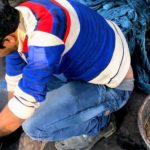Phulia is a clean picturesque town. Getting here takes two hours, depending on time of day. I left Kolkata at 4:30 AM and reached Phulia before 7 AM. The later you leave, the longer it takes.
Homes lie low to the ground. No high-rises here. There are maidans where children play. Thatched huts interspersed with brick-and-mortar homes— a sign of the town’s rising prosperity— line the narrow lanes. The beauty of the town lies in its mango orchards, groves of fruit trees, fluttering butterflies and a lifestyle that seems both authentically simple yet peaceful.
The steady hum of spinning wheels forms the background noise along some roads. Peer behind the trees and you will see women sitting cross-legged on the floor, pulling thread. The sound of looms punctuate other roads and entire communities are devoted to this task. The whole family takes turns weaving. Children stand around and watch.
Rice, mangoes and festivals
There are verdant rice fields all around. Water glints from the paddy fields. Rice is harvested and stored in cylindrical wooden barrels. The number of varieties is stupendous. Bengalis love rice and grow at least a dozen varieties. Govindobhog is the most famous but there are others too: humble everyday rice that is eaten by the locals.
When I visited, the town had just finished celebrating Saraswati Puja: for the goddess of learning. Decorated images of the goddess guarded the loom. Beside her were books laid out for her blessing. Interesting choice of books: on pharmacology, economics and engineering. The next generation of Phulia citizens were on their way to college.
Cow dung is patted on walls and left to dry. In fact, many of the homes are made with wood. Bare torsoed men squat on the ground to separate wheat from chaff. Everyone knows each other. Kids walk into their neighbors’ homes unannounced. Girls ride bicycles to school. Men zip around in motorbikes.
Amidst it all is the steady thrum of the loom. Here is a video that gives you a sense of the weaving ecosystem in and around Phulia





